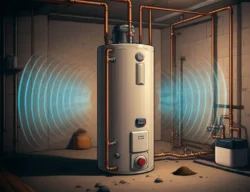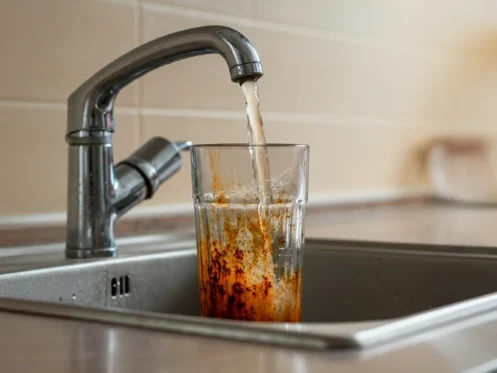Your water heater is the unsung hero of your home—providing hot showers, clean dishes, and cozy baths. But like any hardworking appliance, it won’t last forever. Over time, wear and tear on your water heater can affect its performance, leading to a range of issues, from lukewarm water to an unexpected system breakdown.
Spotting the early warning signs of a failing water heater can save you from costly repairs and water damage. We’re here to walk you through the top 7 signs your water heater is failing, and what you can do about it.
1. Inconsistent or No Hot Water
Is your morning shower suddenly less than steamy? If your water isn’t getting as hot as it used to—or if it only stays warm for a few minutes—it’s a clear sign something’s up. The culprit could be a broken thermostat, a worn-out heating element, or even sediment buildup at the bottom of the tank.
What to do: Start by double-checking your thermostat settings. If that doesn’t solve the problem, it’s time to schedule an appointment with a professional plumber. A tune-up or regular flushing might fix the issue, but if your water heater is old, replacing it could save you money in the long run.

2. Strange Noises Coming from the Tank
Is your water heater making popping or rumbling sounds? These strange noises come from air bubbles trapped in sediment buildup. If ignored, this sediment buildup (usually calcium or lime) can lower your water heater’s efficiency, overheat the tank, or lead to a complete unit failure.
What to do: If you hear unusual noises, it’s time to flush your water heater to remove the sediment. If the noise persists after flushing, your water heater may be reaching the end of its lifespan, and it’s time to start exploring replacement options.
3. Leaks Around the Water Heater
Any visible water pooling around your water heater should be taken seriously. Leaks could indicate anything from a loose valve to corrosion in the tank itself. If left unaddressed, even a small water heater leak can lead to significant water damage in your home.
What to do: Immediately shut off the water supply and the power (if it’s an electric water heater). Contact a licensed plumber to inspect the water heater for cracks, leaks, or a faulty valve. If the tank itself is leaking, a replacement is often necessary, as repairs may not be effective.
4. Water Is Discolored or Smelly
If your hot water tastes metallic, looks rusty, or smells strange, it’s a warning sign. Brownish water often means tank corrosion, while a sulfur or “rotten egg” smell suggests bacteria buildup.
What to do: Flushing the tank might clear out sediment and bacteria. If the issue persists, the tank’s anode rod (the part that prevents rust) might need replacing. A professional plumbing inspection will help identify the best way forward.

5. Water Heater is Over 10 Years Old
Water heaters, like all appliances, have a shelf life. Most land around 8-12 years, depending on their type and maintenance. If your water heater is over 10 years old, it’s reaching the end of its expected lifespan.
An aging water heater is more likely to experience frequent issues like leaks, inconsistent heating, and poor efficiency—problems that impact performance and drive up your energy bills.
What to do: If your water heater is nearing (or has passed) its 10-year mark, it’s time to start thinking about a replacement. Modern energy-efficient models, like tankless water heaters, can save you money in the long run. Not sure where to start? Give the experts at Bumble Breeze a call—we’re happy to recommend the perfect replacement for your home!
6. Increased Energy Bills
If you’ve noticed a sudden spike in your energy bills, it could be because your water heater is working harder than it should. An aging or poorly maintained water heater has to work harder to heat water, leading to higher energy consumption.
What to do: Check for sediment buildup, as it’s a common cause of inefficiency. Regular maintenance, such as draining and cleaning the tank, can often improve performance. If your unit is older, consider replacing it with an energy-efficient model, such as a tankless water heater.

7. Pressure Relief Valve Problems
The pressure relief valve is an essential safety feature in your water heater, designed to release excess pressure and prevent the tank from bursting. If the valve leaks or malfunctions, it can lead to dangerous pressure buildup and pose a serious risk of explosion.
What to do: Don’t ignore a leaking or malfunctioning valve. Contact a professional plumber immediately to inspect and replace the valve if necessary. A quick repair or replacement can restore the safety of your water heater system.
Conclusion: Stay Ahead of Water Heater Problems
Spotting these signs early can save you from cold showers, costly repairs, and potential water damage in your home. Regular maintenance, including flushing and system checks, can extend the life of your water heater and keep it running.
If you notice any of the above issues, don’t wait until they worsen—contact Bumble Breeze to inspect, repair, or replace your water heater before a small problem becomes a costly emergency.
Contact the Pros at Bumble Breeze
Need help deciding if it’s time for a replacement water heater? Bumble Breeze is here for you! Whether you need repairs, maintenance, or a new energy-efficient system, we’ve got your back. For expert water heater care and plumbing services, give us a buzz today!


